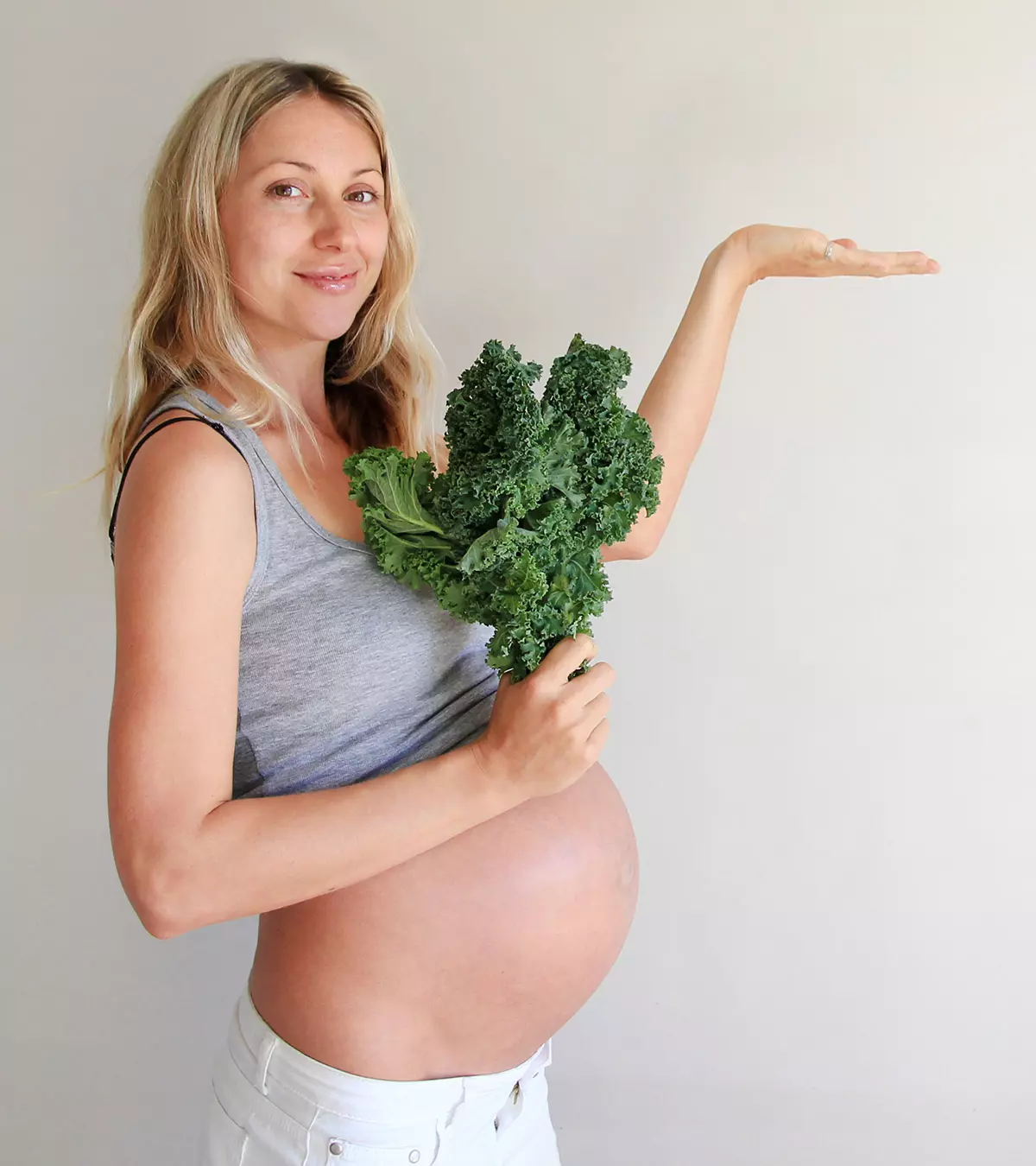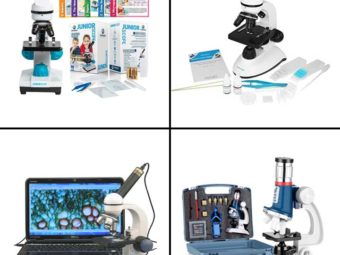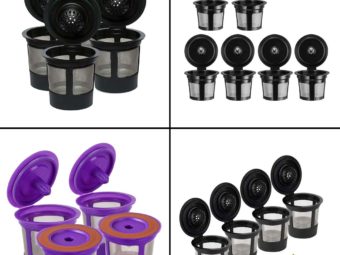
Image: Shutterstock
Adequate iron intake during pregnancy is important for the healthy growth of the fetus and the prevention of pregnancy-related complications. In addition, iron is required in the body for various functions, such as hemoglobin formation and strengthening the immune system. However, it has been found that 9% of women between ages 12 and 49 have iron deficiency (1).
During pregnancy, the need for iron in the body increases because of the increase in blood volume required for the growth of the baby and the preparation of labor. In case of a deficiency, your doctor will help you decide the dosage of iron you require.
Read this post to learn about the importance of iron during pregnancy and the amount of iron pregnant women require.
Why Is Iron Important During Pregnancy?
Even if you’re not pregnant, your body requires iron for a range of functions.
- It is responsible for the formation of hemoglobin, a protein present in red blood cells, which carry oxygen.
- Iron is a crucial component of myoglobin, a protein that supplies oxygen to the muscles, and collagen, which helps build bone, cartilage and other connective tissues.
- It is also necessary for the production of many essential enzymes and helps in strengthening your immune system.
You need to increase the consumption of iron during pregnancy for the below reasons:
1. To make extra hemoglobin:
During pregnancy, your body produces almost 50% more blood than it usually does, which is why you need extra hemoglobin and therefore extra iron.
2. Pre-existing iron deficiency:
Many women are deficient in iron even before they get pregnant. The insufficient amount of iron makes one feel tired. Hence they need extra iron during pregnancy.
3. Increased requirement for baby’s growth:
As the baby grows, the requirement for iron increases, especially during the second and third trimesters of pregnancy.
4. To fight complications during pregnancy:
Lack of iron during pregnancy is linked to several pregnancy complications such as preterm delivery, low birth weight, infant mortality, etc (2). You can avoid all these with sufficient intake of iron.
Now that you know the importance of iron, you should also know whether you are getting enough iron. How much do you need? Can you get it through diet alone or add a supplement?
Read on to figure all the above.
Are You Getting Enough Iron?
Your body uses more iron during pregnancy to make the extra blood essential for you and your fetus. It also helps in transporting oxygen from lungs to others parts of the body, and to the baby. So, if you are not taking enough iron, you will feel tired quickly.
To know if you are taking enough iron, you need to know how much you should actually take.
How much iron can you consume during pregnancy?
You need a total of 800 milligrams (mg) during pregnancy. Out of this, fetus and placenta require 300mg, and maternal hemoglobin requirement is 500mg.
Your body uses a high amount of iron during the second half of pregnancy. Therefore, the demand increases from 0.8mg a day in your first trimester to 6-7mg in the later stages.
On the whole, you require 2 to 4.8 milligrams of iron every day. It means you must take 20 to 48 milligrams of dietary iron for the body to absorb the required amount. The rest will be shed through skin, urine, and gut (3).
According to the CDC, the recommended iron intake during pregnancy should be 27-30 milligrams of iron supplement every day by the time of their first prenatal visit.
What Foods Are High In Iron?
In addition to the supplements, your doctor may also recommend iron-rich foods during pregnancy that you could include in your daily diet.
There are two types of iron: heme and non-heme.
Heme iron is found in animal sources such as red meat, beef, turkey, chicken, pork, and fish. Your body absorbs this iron type better than the other type. Therefore, it is good to take more of heme foods.
Non-heme iron is found in plant sources such as spinach, beans, dried fruits, tofu, whole grains and iron-fortified foods.
Some of the foods containing heme iron (per three-ounce serving) are:
- Lean beef chuck steak – 3.2mg
- Lean beef tenderloin – 3mg
- Beef liver – 5.2mg
- Chicken breast meat – 1.1mg
- Chicken dark meat – 1.1mg
- Chicken liver – 11mg
- Turkey breast meat (roasted) – 1.4mg
- Turkey dark meat (roasted) – 2mg
- Pork loin chop – 1.2mg
- Light tuna, canned – 1.3mg
- Canned oysters – 5.7mg
Foods containing non-heme iron:
- One cup instant oatmeal (iron fortified) – 10mg
- One cup ready-to-eat cereal fortified – 24mg
- One cup cooked lentils – 6.6mg
- One cup soybeans, boiled – 8.8mg
- One cup chickpeas – 4.8mg
- One cup lima beans, cooked – 4.5mg
- One cup kidney beans, cooked – 5.2mg
- One cup pinto or black beans, cooked – 3.6mg
- One ounce pumpkin seeds, roasted – 4.2mg
- Half cup boiled spinach – 3.2mg
- Half cup raw tofu, firm – 3.4mg
- One cup prune juice – 3mg
- One tablespoon blackstrap molasses – 3.5mg
- One-fourth cup raisins – 0.75mg
- One slice enriched white or whole wheat bread – 5.7mg
These were the sources of iron during pregnancy. But, sometimes it is hard to get enough iron from the diet, especially in a vegan or vegetarian diet. Tell the healthcare provider of your food preferences so that she can monitor the iron levels carefully.
Tips To Meet Your Iron Requirements During Pregnancy
Here are some simple ways to retain iron while planning your everyday diet:
- Use a cast iron pan for cooking whenever possible (while using tomato sauces and other acidic and moist foods). They absorb iron and help you get some amount (4).
- Avoid consuming caffeine along with meals. Caffeine products contain phenols that interfere with the absorption of iron.
- Consume foods rich in vitamin C such as oranges, broccoli, strawberry, etc. Vitamin C is known to increase the absorption of iron by up to six times.
- Cut down on foods like legumes, whole grains, soy foods, and spinach that contain iron inhibitors (substances that prevent the absorption of iron) or balance them with iron boosting foods such as meat, fish, and poultry.
- Calcium hinders absorption of iron. If you are on calcium supplements, make sure you space them between meals.
- Add fish or meat to your everyday meal as heme foods help your body absorb non-heme foods.
What Happens If You Don’t Get Enough Iron During Pregnancy?
Iron deficiency is the primary nutritional deficiency that happens during pregnancy. It usually develops during the third trimester. Low iron levels can result in:
- Lowered work capacity
- Tiredness
- Decreased resistance to infections
- Cardiovascular stress
- Iron deficiency anemia
Low iron levels during pregnancy can pose serious risks for the baby as well, including:
- Low birth weight
- Preterm baby
- Infant mortality
If you are anemic even before pregnancy, you should bring it to your doctor’s notice. Your OBS-GYN will recommend the quantity of iron you require from supplements.
Should You Take An Iron Supplement When Pregnant?
As the pregnancy progresses, your gynecologist will prescribe iron tablets. However, it does not mean that you have iron deficiency. They usually advise supplements as a precautionary measure because the iron requirement during pregnancy increases in the following months. Moreover, you may not get enough iron from your everyday diet.
During your first prenatal check-up, your doctor will check the iron levels and suggest prenatal vitamins depending on the results. However, you should not take them unless your healthcare provider prescribes (5).
Remember:
You may need to be particular about certain points when you’re taking iron supplements during pregnancy.
- Take the supplements in an appropriate dosage. If you have skipped taking it on one day, don’t take two the next day.
- Consume fiber-rich foods when you are on iron supplements as the medicines tend to harden the stool making it difficult to pass.
- Make sure the supplements you are using are fresh and well within the expiry date.
- Rule out the risk of any drug interactions or allergic reactions by talking to your doctor before taking iron supplements.
Is Too Much Iron Bad During Pregnancy?
You can have up to 45 milligrams of iron per day. If you take more than this amount, it may increase iron levels in the blood making it risky for both the mom and the fetus (6).
Excess iron can result in the following conditions:
- Gastrointestinal issues such as nausea and constipation.
- Oxidative stress or gestational diabetes.
- Imbalance in the body which may play a vital role in fertility.
- Miscarriage associated with preeclampsia.
Sometimes, the supplements cause side-effects, especially if the dosages are above the required daily value.
What Are The Side Effects Of Iron Supplements During Pregnancy?
You need to balance the iron content in the body during pregnancy to avoid the following side- effects that result from the supplements:
- Gastrointestinal tract upset: Constipation is one of the major issues you may experience. Prune juice will provide quick relief.
- Darker stools: Iron changes the color of your stool. However, there is nothing to worry about it (7).
- Nausea and diarrhea: Sometimes, supplementation can make you feel nauseous. You can, therefore, take it along with a snack or before going to bed.
Best Time To Take Iron Tablets During Pregnancy
The best time to take iron pills is one or two hours before or after meals because they are absorbed better on an empty stomach.
Taking iron supplements with other foods, such as milk, tea, coffee, cheese, eggs, spinach, whole grains and yogurt, can deplete their value.
Is It Safe To Take Iron Injections During Pregnancy?
Iron injections are restricted to only those in whom oral supplementation fails. This means injections are given to those who cannot absorb oral iron or have severe anemic condition despite taking adequate iron doses.
- This is a costly treatment.
- Hypersensitivity, fever, vomiting, nausea, joint pains, wheezing, and breathlessness are some of the side-effects of iron injections.
- Moreover, injectable iron is teratogenic (disturbs the fetal development and might result in congenital disabilities).
The best way to get enough iron supply to your body during pregnancy is the natural way. Eat foods that are rich in iron and those which help absorb iron from the other foods. A healthy and nutritious diet should help your body get iron that is sufficient for you and your baby.
Getting enough iron during pregnancy is essential. Your doctor may give you iron supplements to fulfill your growing demands for the nutrient, but getting it from your daily diet is more important. You can add iron-rich food items, such as chicken liver, turkey meat, soybeans, and chickpeas, to your diet to increase your iron uptake. Use a cast iron pan for cooking, eat foods with vitamin C, and avoid consuming caffeine to meet your iron requirements. Contact your doctor if you have any side effects due to iron supplements.














